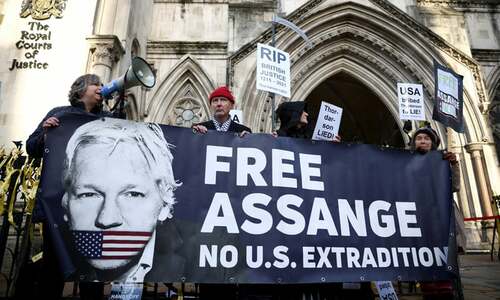A British judge on Wednesday formally approved the extradition of Julian Assange to the United States to face spying charges. The case will now go to Britain’s interior minister for a decision, though the WikiLeaks founder still has legal avenues of appeal.
The order, which brings an end to the years’-long extradition battle closer, comes after the UK Supreme Court last month refused Assange permission to appeal against a lower court’s ruling that he could be extradited.
District Judge Paul Goldspring issued the order in a brief hearing at Westminster Magistrates’ Court, as Assange watched by video link from Belmarsh Prison and his supporters rallied outside the courthouse, demanding he be freed.
Home Secretary Priti Patel will now decide whether to grant the extradition.
The move doesn’t exhaust the legal options for Assange, who has sought for years to avoid a trial in the US on charges related to WikiLeaks’ publication of a huge trove of classified documents more than a decade ago.
His lawyers have four weeks to make submissions to Patel, and can also seek to appeal to the High Court.
Assange's lawyer Mark Summers told the court that the legal team had “serious submissions” to make.
The US has asked British authorities to extradite Assange so he can stand trial on 17 charges of espionage and one charge of computer misuse. American prosecutors say Assange unlawfully helped US Army intelligence analyst Chelsea Manning steal classified diplomatic cables and military files that WikiLeaks later published, putting lives at risk.
Supporters and lawyers for Assange, 50, argue that he was acting as a journalist and is entitled to First Amendment protections of freedom of speech for publishing documents that exposed US military wrongdoing in Iraq and Afghanistan. They argue that his case is politically motivated.
A British district court judge had initially rejected a US extradition request on the grounds that Assange was likely to kill himself if held under harsh US prison conditions. US authorities later provided assurances that the WikiLeaks founder wouldn’t face the severe treatment that his lawyers said would put his physical and mental health at risk.
In December, the High Court overturned the lower court’s decision, saying that the US promises were enough to guarantee that Assange would be treated humanely. The Supreme Court in March rejected Assange’s attempt to challenge that ruling.
Assange’s lawyers say he could face up to 175 years in jail if he is convicted in the US though American authorities have said the sentence was likely to be much lower than that.
Assange has been held at Britain’s high-security Belmarsh Prison in London since 2019 when he was arrested for skipping bail during a separate legal battle. Before that, he spent seven years inside the Ecuadorian Embassy in London to avoid extradition to Sweden to face allegations of rape and sexual assault.
Sweden dropped the sex crimes investigations in November 2019 because so much time had elapsed.
Last month, Assange and his partner Stella Moris married in a prison ceremony.



































